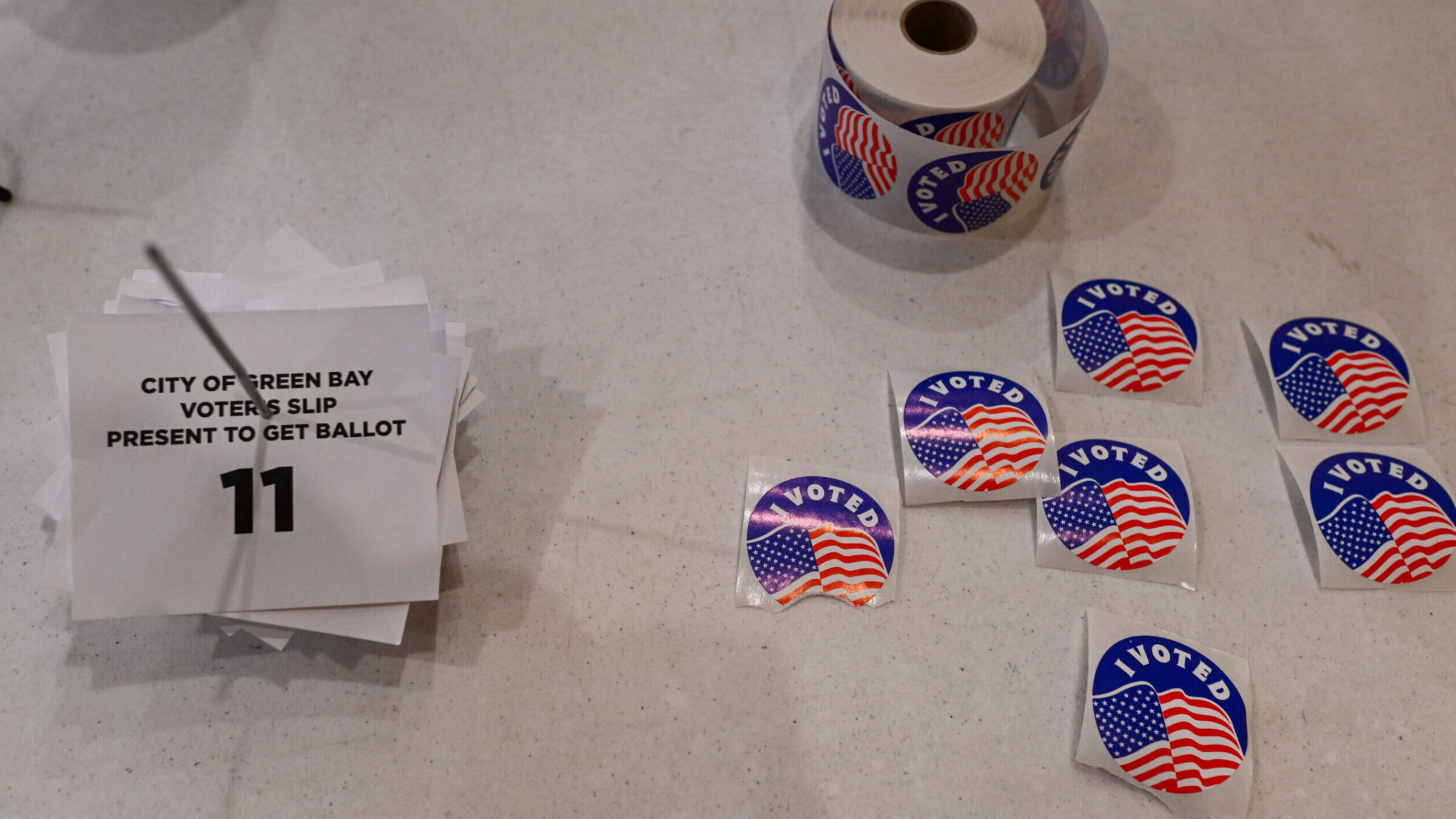Almost one month after Election Day, here’s what we know about how Jews voted
Donald Trump won a higher percentage of Jews than in 2020, but not by the margins he predicted.

Voting stickers at a polling station in Green Bay, Wisconsin, April 2, 2024. (Joshua Lott/The Washington Post via Getty Images)
(JTA) — WASHINGTON — Nearly a month after Election Day, it’s safe to say the Jewish results are in, and that they contain a measure of good news for both Republicans and Democrats.
Jews, who make up approximately two percent of the U.S. population, present a challenge to pollsters. But several polls in the wake of Nov. 5 have returned results that are similar enough to paint a picture of how Jewish Americans voted this year: Jewish voters supported Kamala Harris by somewhere between 63% and 71%, but Donald Trump won a higher percentage of Jews than he did in 2020.
The background
For about a century, Jews have been a reliable piece of the Democratic base, usually delivering two-thirds or more of their votes to the party’s presidential nominee. But leading up to Election Day 2024, there was chatter in both parties about whether this would be the year when large numbers of American Jews would vote Republican. (For Republicans, the 1980 election was the high water mark, when Ronald Reagan won approximately 40% of Jewish votes.)
Hamas’ Oct. 7 attack, and the groundswell of anti-Israel criticism from progressive groups that followed, made it seem like a political change could be afoot. Donald Trump predicted that he could net 40% of the Jewish vote — and famously said that Jews would be to blame if he lost.
Jewish Democrats, meanwhile, pointed to polls showing that their Jewish base was solid. In the days before the vote, however, anxieties surfaced about whether that support was eroding.
The big picture
In the weeks since Trump’s victory over Kamala Harris, several polls have measured Jewish support. And while their numbers differ, they all tell the same story.
According to a recently released poll by Mark Mellman, a Democratic Jewish pollster, Harris won the Jewish vote 71% to 26%. Mellman did not conduct a similar poll in 2020, but he noted that a few other organizations did poll Jews in both elections. All show that while Democrats still command a large majority of Jewish voters, that advantage is slipping a little.
“The overwhelming majority of American Jews voted for Harris,” said Mellman, who also founded the advocacy group Democratic Majority for Israel. “There probably was some amount of erosion, and some amount of that erosion was clearly related to Israel issues.”
That change comes in a year that also saw shifts toward Trump from other traditionally Democratic constituencies, including Black and Latino men. Analyses have also found that the national shift in the electorate was due mostly to Harris losing large numbers of Democratic votes, rather than Trump gaining large numbers of Republican votes.
The numbers
The three polls reviewed by Mellman all used, in his words, the “same sponsor, same surveyor” in both 2020 and 2024. Here’s what they found:
- A survey conducted by GBAO strategies for J Street, the liberal Jewish Middle East lobby, found that this year, Harris beat Trump among Jews 71% to 26%, a 45-point margin. That’s 11 points less than the Democratic margin in 2020, when Jews chose Joe Biden by 56 points over Trump, 77% to 21%.
- The Cooperative Election Study out of Harvard University found that this year, Harris beat Trump among Jews 63% to 36%, a 27-point spread. In 2020, the poll found that Jews voted for Biden over Trump 69% to 30%, a 39-point difference.
- The Associated Press/Fox analysis of online polling, conducted by the University of Chicago, found that Jews voted for Harris over Trump 66% to 32%, a 34-point spread. In 2020, the same pollsters found that Biden won American Jews 69% to 30%, a 39-point margin.
Mellman’s poll, commissioned by the Jewish Electorate Institute, was conducted from Oct. 31-to Nov. 8; the election was Nov. 5. The poll reached 1,093 voters online through YouGov and has a margin of error of 3%.
He also surveyed Jewish voters’ opinions of the candidates’ Israel policies, which he said may explain Trump’s gains. While 48% of Jewish voters thought Trump would be more pro-Israel than Biden, only 7% said the same of Harris. And while 23% of Jewish Trump voters said they had a high attachment to Israel, 9% of Harris voters said the same.
Trump scored far lower among voters on other issues Jewish voters prioritized, the poll said. Harris was seen as “most identified with abortion rights, protecting Social Security and Medicare, addressing climate change and protecting democracy,” a JEI release said.
Harris had a 68% favorable and 32% unfavorable rating among the Jewish voters surveyed, while Trump’s ratings were 24% favorable and 76% unfavorable.
The JEI release also dug down into the identity of voters, finding that 74% of Jews over the age of 60 voted for Harris, compared to 70% of Jews 18-39. There was also a gap associated with synagogue attendance: “81 percent of Jews never attending services selected Harris, while 61 percent of those going more than once a month did so.”
Those figures would be consistent with actual voting results in heavily Orthodox Jewish neighborhoods, as opposed to polls, that showed a marked preference for Trump in places like Crown Heights, Brooklyn and Teaneck, New Jersey.















